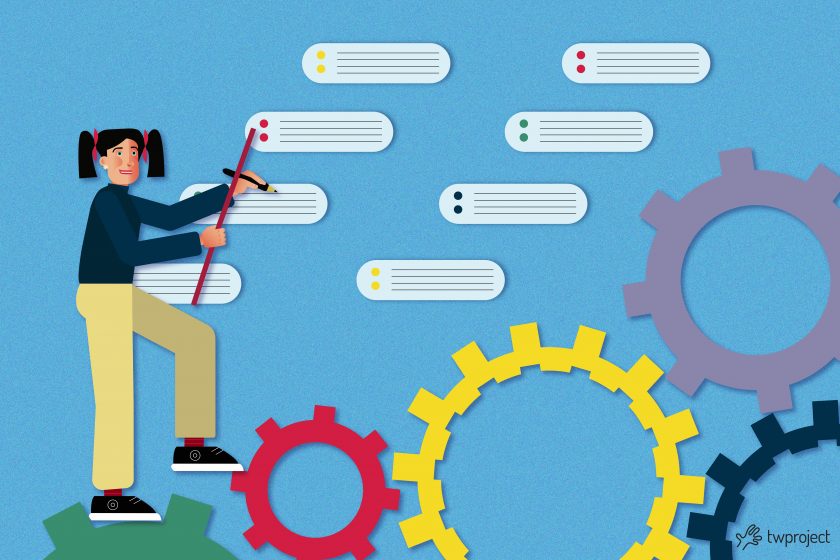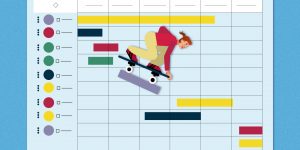As a project manager, possessing analytical skills for successful projects is the absolute core of required skills.
Analytical thinking can help you explore complex problems, make decisions and find solutions effectively.
CONTENT
So let’s take a closer look at the definition of analytical thinking and why it is so important.
What are analytical skills?
Analytical skills are those competencies that allow you to observe, investigate and interpret data in order to develop complex ideas and solutions.
You can apply analytical thinking in virtually any situation, such as in project management or in relationship problems, customer needs and more.
Analyzing a topic means having a strong understanding of it and being able to discuss it with some level of expertise.
People with strong analytical skills can often analyze a situation, topic or problem quickly and often work well in a team environment.
The analytical thought process
The application process for analytical skills usually involves the following steps:
- Issue or problem identification
- Information collection through observation
- Possible solutions developed after a thorough understanding of the topic
- Test solutions or new ideas based on what you understand
- Post-analysis or review of what solutions worked to evaluate and apply new learnings
A key element of analytical thinking is the capability to quickly identify cause and effect correlations; this means understanding what might happen during the problem-solving process and examining how new ideas relate to the situation.
Why are analytical skills important?
Analytical skills are important soft skills because they allow you to find solutions to common problems and make well-informed judgments about what action to undertake next.
Understanding problems and analyzing the situation to find feasible solutions is a key skill in every position and in every industry.
Developing this skill can improve to achieve business goals and support personal career goals.
Using analytical skills in daily work demonstrates an ability to think reliably and pragmatically, with decisions made based on analysis of meaningful data.

Analytical skills examples
Here are some examples of analytical skills for successful projects:
- Critical thinking
Critical thinking is a major skill in any job position, from managers to CEOs, from contractors to the freelance workers. This way of thinking provides the ability to question an idea, assertion or opinion.
For example, if told that a certain task can’t be done or a certain goal can’t be achieved, critical thinking skills require asking deeper questions so you can understand why and what the causes are. Critical thinkers take the time to fully understand a problem in order to develop a feasible solution.
- Data and information analysis
Data and information analysis is one of the major parts contained in the analytical skills. After identifying a problem, it is important to know how to review and analyze the available data or information that will be essential to its resolution. To collect and analyze the proper data, it is important to first know the right questions to ask.
For example, if you are evaluating the performance of a work team, you might ask yourself: ‘What factors influence productivity?’, ‘What are the bottlenecks in current processes?’ or ‘Which tasks take longer than expected?’.
If instead you analyse customer behaviour, you might ask yourself: “Which products sell the most at given times?”, “What are the common characteristics among the most loyal customers?” or ‘Which marketing channels generate the most conversions?‘.
Asking the right questions helps to focus on the most relevant information and gain useful insights for strategic decision-making.
- Research
Research is an integral part of the analytical thinking process. Once a problem has been identified, it is important to conduct the necessary research for a solution. This can be as quick and easy as asking a co-worker who may be more knowledgeable or as laborious as searching through official channels.
The research process involves knowing what information is valuable or essential to solving the problem.
- Communication
It is crucial to constantly be in communication with stakeholders as problems are identified, solutions are developed, research is conducted, and results are discussed.
Once a problem or solution has been identified, communicating it effectively to stakeholders is essential to achieving the end goal. Transferring this information clearly and completely is a key skill in the analytical thinking process.
- Troubleshooting
After a problem, situation, or area for improvement has been determined and the research has been completed, it is important to find a solution. Analytical skills are then used to sort and organize the data discovered during the research phase to find a reasonable and effective solution.
How to improve analytical skills
Improving your analytical skills can help you achieve various goals not only in your career, but also in your personal life.
You can improve your analytical skills by following some of these tips:
- Undertake a leadership role that requires using critical analytical skills.
- Practice key analytical skills in your current role.
- Attend classes and trainings that boost the use of analytical thinking.
- Take part in activities that require the use of analytical skills.
- Ask for advice or mentoring from industry professionals known for their analytical skills.
- Improve subject matter knowledge, which is crucial for faster problem solving.
One trick is to also consider what analytical skills you possess and those in which you have room for improvement and potential.
Take note of specific times when you have used analytical skills to improve something or solve a problem, either at work or in your personal life, helps identifying strenghts and weaknesses.
This is clearly a process that evolves and grows throughout life.
Analytical skills can be learned and improved over time and through the right exercises.
Ultimately, analytical skills for successful projects are often defined as the capability of breaking down problems into parts to see connections or interdependencies.
Project managers who have these skills can plan efficiently and then drive projects to success.
Analytical skills are important not just for effective project management but also for advancing personal career goals. They enable you to validate your data analysis skills, proving your competence through professional certifications. These credentials signal that you possess the analytical capability to break down complex projects efficiently and effectively. Such validation can accelerate career advancement by demonstrating your robust problem-solving techniques and critical thinking abilities in handling real-world issues.
Furthermore, they can accurately predict outcomes and develop plans to achieve goals and objectives.
How a project management software can help?
A software like Twproject can guide you in breaking down the wbs of your project, in defining the dependencies between the various phases and in the analysis of the durations. In addition to this, constant and lasting use will make evident the real effort spent and will allow you, over time, to refine this breakdown also highlighting repeated criticalities that can therefore be avoided.
The wbs can also be further refined up to the insertion of all the daily activities (attached to-do lists), to help, not only the project manager, but also the whole team to manage the activities in an organized way.
Try Twproject and discover how it can help you improve your data analysis and optimise your project management.




